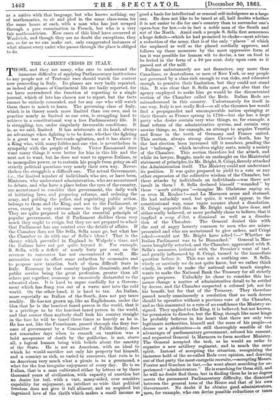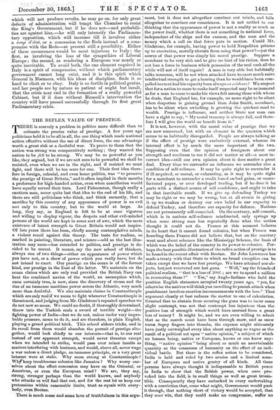THE CABINET CRISIS IN ITALY.
THOSE, and they are many, who care to understand the immense difficulty of applying Parliamentary institutions to any people not of Teutonic race should watch the contest now proceeding in Italy. Its phases are very badly reported, as indeed all phases of Continental life are badly reported, for we have surrendered the function of reporting to a single journal, which of late has chosen not to report, but the facts cannot be entirely concealed, and for any one who will watch them there is much to learn. The governing class of Italy, which is in theory much more limited than our own, and in practice nearly as limited as our own, is struggling hard to achieve in a constitutional way a free Parliamentary life. It is struggling, too, under singularly favourable conditions. It is, as we said, limited. It has aristocrats at its head, always an advantage when fighting is to be done, whether the fighting is a great war or a Free-trade agitation, and it has above it a King who, with many foibles and one vice, is nevertheless in sympathy with the people of Italy. Victor Emmanuel does want many things it were better for him in this life and the next not to want, but he does not want to oppress Italians, or to monopolize power, or to restrain his people from going on all strictly political questions very nearly their own way. Never- theless the struggle is a difficult one. The actual Government, L e., the limited number of individuals who are, or have been, Ministers, who understand administration, who are accustomed to debate, and who have a place before the eyes of the country, are accustomed to consider that government, the daily work of initiating laws, and preparing reforms, and ordering the army, and guiding the police, and regulating public action, belongs to them and the King, and not to the Parliament, or even, except in very extreme cases, to the people at large. They are quite prepared to admit the essential principle of poliular, government, that if Parliament dislikes them very much they ought to resign, but they are not prepared to admit that Parliament has any control over the details of affairs. If the Chamber does not like Sella, Sella must go, but what has the Chamber to do with one of Sella's ideas ? That is the theory which prevailed in England in Walpole's time, and the Italians have not got quite beyond it. For example, S. Sella, with a deficit of nearly forty per cent. on the revenue to encounter has not encountered it well. His nbtessities were to effect some reduction by economies and to propose new taxation, both of them difficult feats in Italy. Economy in that country implies dismissals, and the public service being the great profession, greater than all others put together, economy is excessively distasteful to the educated class. It is hard to argue cordially for a Govern- ment which has flung you out of a warm nest into the cold world. On the other hand, it is hard to tax. An Italian, more especially an Italian of the-' South, does not pay taxes readily. He has not grown up, like an Englishman, under the idea that he is the heaviest taxed person in the world, that it is a privilege to be the heaviest taxed person in the world, and that sooner than anybody shall look his country straight in the face he will be taxed three times as heavily as he is. He has not, like the Frenchman, passed through the fiery fur- nace of government by a Committee of Public Safety, does not remember days when to remark on taxation was a bold acceptance of death by the guillotine, is not, above all, a logical human being with beliefs about the sanctity of the State. He is not an American, with an ideal to which he would sacrifice not only his property but himself, and ,a country so rich, so varied in resources, that ruin is to an American very much what a Lpicnic is to a gourmand, a whet for the less irregular enjoyment of every day. He is an Italian, that is a man cultivated either by letters or by three thousand years of civilization, with capacity of exertion but no desire for toil, •with a vast, many-sided, over sensitive capability for enjoyment, an intellect so wide that political freedom does not give it full aliment, and an acquired but
as a native with that language, but who knows nothing, say good a basis for intellectual or sensual self-indulgence ass large of mathematics, to sit and plod in the same class-room for one. He does not like to be taxed at all, half doubts whether the same hours at each, with a man who has just scraped it is not easier to die for one's country than to surrender one's through a pass examination in French, but who is a very opera-box for her,—is in fact a noble man of the South and fair mathematician. Now cases of this kind have occurred at not of the North. Amid such a people S. Sella first announces Woolwich, and though they are no doubt the exceptions, they a huge deficit—which he had promised to choke—next advises are, so far as we can make out, only exaggerated instances of a reduction of the army, that is of the only "places " of which what almost every cadet who passes through the place is obliged the unplaced as well as the placed cordially approve, and to do. follows up these measures by the most oppressive form of tax it was possible for human wit to devise, a tax on food to be levied, in the form of a 10 per cent. duty upon corn as it passed out of the mill.
Italians unfortunately are not financiers, any more than Canadians, or Australians, or men of New York, or any people not governed by a class rich enough to run risks, and educated enough to perceive their limitation, but they could not stand this. It was clear that S. Sella must go, dear also that the agency employed to make him go would be the discontented section of the Chamber called the Reds. Italian Reds are misunderstood in this country. Unfortunately for itself in one way, Italy is not really Red—or all who threaten her would find a propagandist and unconquerable nation springing at their throats as France sprang in 1798—but she has a large party who desire .certain very wise'things, as, for example, a final reform of the administrative system, and certain very unwise things, as, for example, an attempt to acquire Venetia and Rome in the teeth of Germany and France united. This section, always strong since •Cavour's death, has by the last election been increased till it numbers, pending the last " ballotage," which involves eighty seats, nearly a moiety of the Chamber. This section therefore led the attack, and while its lawyer, Boggio, made an onslaught on the Ministerial• statement of principles, its Mr. Bright, S. Crispi, fiercely attacked the Administration itself. The Ministry could not understand its position. It was quite prepared to yield to a vote or any other expression of the collective wisdom of the Chamber, but these attacks by individuals on individuals—was there not insult in them S. Sella declared himself " wounded " by these "acerb ontaques —imagine Mr. Gladstone saying so, or even M. Rouher !—and. La Marmora arose and stormed. He had unluckily used, but quite, it would appear, in the constitutional way, some vague menace about a dissolution. S. Crispi repeated this, as Mr. Bright might have done, and either really believed, or more probably chose to believe, that it implied a coup d' e'tm a dismissal as well as a dissolu- tion of the Chamber. The general denied this with the sort of angry honesty common to men who are misre- presented and who are accustomed to give orders, and Crispi asked—would not Mr. Bright have asked ?—" Whether an Italian Parliament was to be Bismarked." General la Mar- morn haughtily retorted, and the Chamber, aggravated with S. Sella's measures, irritated with the Premier's want of tact. and greatly influenced by S. Crispi, turned to the immediate question before it. This was not a 'soothing one. S. Sella, wisely or un-wisely we do not quite know, but we rather think wisely, in order to make the national audit much simpler, wants to make the National Bank the Treasury for all strictly spCcie purposes. Unluckily he chose to consider this im- mense change a matter of administrative detail to be settled by decree, and the Chamber suspected a colossal job, not for his benefit, but for that of the Treasury. They therefore passed nearly unanimously 'a resolution that no such decree should be operative without a previous vote of the Chamber, and as this amounted to a vote of no confidence the Ministry re- signed. They applied to the King, it is believed; but not known, for permission to dissolve, but the King, though like most kings he probably believes in his heart that there are only two legitimate authorities, himself and the mass of • his people—a decree or a plebiscitum—is still thoroughly sensible of the advantages of parliamentary government, refused his consent, and requested General la Marmon. to form another Ministry. The General accepted the task, as he would an order to organize a new artillery regiment, and in much the same spirit. Instead of accepting the situation, recognizing the immense hold of the so-called Reds over opinion, and drawing out of that party the most energetic recruits,—acoepting Messrs. Forster and Goschen in fact,--he went about searching for ex- perienced "administrators." He is searching for them still, and he will no doubt find them, but in finding them he in no degree meets the permanent Parliamentary difficulty, the disaecord between the general tone of the House and that of his own Government. No doubt if he obtains good administrators, ingrained love of the thrift which makes a small income as men, for example, who can devise possible reductions or taxes
which -will not produce revolts, he may go on, for only great defects of administration will tempt the Chamber to resist the King's Government, but if he does not—and probabili- ties are against him,—he will only intensify the Parliamen- tary opposition, which will increase till it involves either a coup d' etat, or a concession to the Reds instead of a com- promise with the Reds—at present still a possibility. Either of these occurrences would be most injurious to Italy ; the first, as involving the loss of the sympathies of Liberal Europe ; the second, as rendering a European war nearly or quite inevitable. To avoid both, the one element required in Italy is a spirit of compromise, without which parliamentary government cannot long exist, and it is this spirit which General in Marmora, with his ideas of discipline, finds it so hard to elicit or to obey. Italy is so fertile in political genius, and her people are by nature so patient of aught but insult, that the crisis may end in the formation of a really powerful Cabinet, but if it does without Ricasoli's intervention the country will have passed successfully through its first great Parliamentary crisis.































 Previous page
Previous page